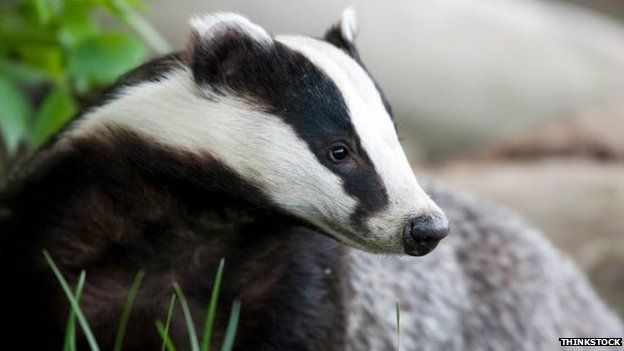Badger cull to be extended into Dorset, government announces
- Published

The badger cull is to be extended into Dorset following pilots in Gloucestershire and Somerset, the government has announced.
Ministers and the National Farmers' Union (NFU) say culling badgers will curb tuberculosis (TB) in cattle, but protesters say it has little effect.
Licences have been granted to allow six weeks of continuous culling in the three counties until 31 January.
Rock star and campaigner Brian May said he would fight the culls in court.
His Save Me Trust trust confirmed the "lawfulness of the decisions to issue the licences will be challenged by a Judicial Review in the High Court".
May, well-known for his anti-cull protesting, said: "We are all hugely disappointed that the government has decided to continue its cull policy, despite Natural England's scientific advisor branding the badger cull 'an epic failure'."
He added: "The badger cull has been a disaster...worse still, it's certain that most of the murdered badgers are perfectly healthy, and free of bovine TB.
"This awful policy must be put to bed now, in favour of a policy that really will address the TB problem in cattle."
Wildlife TV broadcasters Chris Packham and Steve Backshall have also voiced opposition to the cull.
Defending the move, farming minister George Eustice, said: "England has the highest incidence of TB in Europe and that is why we [are] taking strong action to deliver our 25-year strategy to eradicate the disease and protect the future of our dairy and beef industries.
"This includes strengthening cattle testing and movement controls, vaccinating badgers in the buffer zone around high-risk areas and culling badgers where the disease is rife."
The NFU has also welcomed the move but said it was "much slower progress than we wanted to see" and called for culling in more areas.
Badger cull targets
Dorset - Minimum 615, maximum 835
Gloucestershire - Minimum 265, maximum 679 - last year minimum 615, maximum 1,091 (actual culled 274)
Somerset - Minimum 55, maximum 524 - last year minimum 316, maximum 785 (actual culled 341)
Source: Natural England
Analysis of the 2013 pilot culls, commissioned by Defra and by an independent panel of experts, found shooting badgers was not effective.
Official figures showed it cost more than £3,300 for each badger that was killed during the cull in 2014.
Other plans announced by the government include a consultation on compulsory testing for cattle entering low-risk areas, such as the north and east of England, to reduce the risk of new TB cases.
Views will also be sought on controlling TB in non-bovine animals such as pigs, goats and deer.
The move to extend the cull to Dorset has been condemned by the Dorset Wildlife Trust.
Chief executive, Simon Cripps, said: "We are extremely disappointed because science has shown that culling is unlikely to work and will probably make matters worse.
"Scientific tests have shown that diseased and non-diseased badgers will move into areas that badgers have been removed from. So what you get is a stirring of the population and a potential increase in the disease.
"The best way to sort this out is bio-security, to manage your farm so that you keep badgers away from the cattle you feed. Some of the worst outbreaks are where bio-security isn't very good, that accounts for up to 60% of the problem."
A vaccination program has already started in a "buffer zone" around the cull areas but the government believes this alone is not enough and stronger measures are also needed.
Andy Foot, a Dorset beef and arable farmer, said: "It is to be congratulated that we at last got it rolled out to at least another county.
"We have to get on top of this devastating disease that is killing so many cattle.
"Yes do vaccination but in the correct area, where there is no disease. Vaccination will not work in an already infected animal."
- Published28 August 2015
- Published25 August 2015
- Published24 February 2015
- Published9 September 2014
- Published18 December 2014
- Published15 January 2015